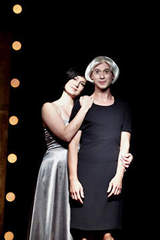| Opera Reviews | 16 April 2024 |
A stylish and exciting eveningby Moore Parker |
|
| Vinci/Handel: Semiramide Wiener Kammeroper 14 October 2013 |
|
|
In the modest setting of Vienna's Kammeroper the material is jazzed-up with modern costumes, a series of building-block cubes (which depict themes and vertical perspectives as required), a pair of wall-to-wall string curtains (which add depth to the stage) and a dazzling blue neon "Babilonia" sign to form the basis of the staging. Keeping the plot moving is no easy task for director and cast alike, with strings of da capo arias (no duets, trios, etc.) to present and with only two sextets to round-off each of the acts, for variety. In this respect, stage director and designer Francesco Micheli proved his mettle creating a strong mix of clearly defined characters requiring physical agility and artistic flexibility from their young and inspired interpreters. The idea of incorporating a drag queen to play Semiramide's pseudo-emasculated son Nino (sensitively, yet grandly played by Alessio Calciolari) proves to be an excellent foil to his mother (who has stolen his identity in order to rule) as well as establishing a catalysing figure who - rather like some contorted muse - influences and interacts with the other protagonists throughout the long series of emotive scenes. The music is dramatically effective - if not particularly memorable - and is a challenge to both pit and cast, without exception. Curtis and the Bach Consort Wien make for an unstintingly stylish and exciting evening while providing superbly controlled support for the vocalists. The essence of the cast is made up of members of the Kammeroper/Theater an der Wien ensemble of soloists - all of them already familiar in a wide gamut of roles, and evidently gaining profoundly from the regime and opportunities afforded them by the company. As Semiramide, Cigdem Soyarslan truly excelled - fully in command of the testing role in every respect. Her dignified presence underscored her intense and cultivated singing, in which the Turkish soprano can boast a generous command of flexibility and dynamic range. Gaia Petrone was bluffingly convincing in the trousers role of the villainous Sibari - ample-toned, fearless in approach, and whetting one's appetite for her forthcoming Sesto and Angelina (Cenerentola) in Vienna. Gan-ya Ben-gur Akselrod rounded-off the female leads with her vivacious and colourful Princess Tamini. The three Princes were well contrasted in every respect, with Andrew Owens evidently enjoying Scitalce's mix of sexual passion and jealous outbursts (and trumping in some remarkably accurate scale work), counter tenor Rupert Enticknap proving more successful in his florid and dramatic moments than in the more introspective as Mirteo, and with Igor Bakan's larger-than-life presence and searing bass-baritone timbre establishing an unforgettable Ircano. In many respects this was a daring project for the Kammeroper, but one which paid off for all concerned - not least, the audience. |
|
| Text ©
Moore Parker Photo © Armin Bardel |
|

 This Kammeroper performance of a new edition of Semiramide by
the eminent baroque specialist Alan Curtis was indeed a rare treat.
Based upon Georg Friedrich Handel's adaptation of Leonardo Vinci's popular
work from the early 18th century, Curtis has here incorporated arias
by Nicola Porpora, Leonardo Leo and Francesco Feo to form a full-scale
opera in two acts with a duration of almost three hours.
This Kammeroper performance of a new edition of Semiramide by
the eminent baroque specialist Alan Curtis was indeed a rare treat.
Based upon Georg Friedrich Handel's adaptation of Leonardo Vinci's popular
work from the early 18th century, Curtis has here incorporated arias
by Nicola Porpora, Leonardo Leo and Francesco Feo to form a full-scale
opera in two acts with a duration of almost three hours. 





